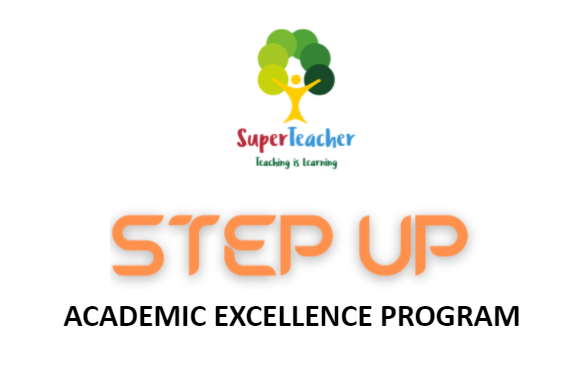Academic Excellence Program

Super Teacher’s StepUp is a research-based Academic Excellence Program. The program is based on the Golden Tetrahedron 4U (GT4U) model, which was successfully implemented in 550 schools across 14 countries. The program significantly impacted the academic standards of the institutions by upskilling the teachers. This translated to better academic transactions, which in turn improved the learning outcomes of the students. This is evident from their performance in the international benchmarking assessments. It is holistic, advanced and sustainable. The four corners of the tetrahedron represent the four domains (4 U’s) of the teaching-learning process, as depicted below:
PROGRAM DETAILS
|
Domain A: Understanding the Curriculum |
|
Module A1 : Steps towards Competency-based Education system In the last few decades, the world has changed a lot. New technologies are coming, unimaginable new phenomena are emerging, and previously unknown new skills have found a place in society. People have started realizing that everyone has his own set of unique skills and capacities. This demands for education, which is not based on knowledge, but on competency. This is the reason CBSE is moving away from rote-learning and shifting towards Competency-based Education (CBE). This module trains educators with a thorough understanding of Competency-based Education.
|
|
Module A2 : Creating Learning Objectives and Bloom’s Taxonomy The key feature of Competency-based Education is that it is based on measurable actions and evidence of learning. The well-written learning objectives work as the units to measure the teaching and learning in Competency-based education. This module gives hands-on experience for writing learning objectives in context to Competency-based education.
|
|
Module A3: Foundational Literacy and Numeracy Foundational Literacy and Numeracy (FLN) refers to a child’s ability to read simple sentences with meaning and solve basic math problems by the end of Class 3. These are critical gateway skills that help children learn meaningfully in higher classes and help them acquire 21st Century skills like critical thinking and problem solving, which are imperative to succeed in the long run. This module provides a thorough understanding of FLN with hands-on activities.
|
|
Module A4: Integration of AI into curriculum This time of Schooling is an age of Learning by Doing, it’s an age of ‘algorithmization of the learnt knowledge’. The persistence of many unsolved global issues and increasing trend of automation in problem solving itself has created a need to nurture a new set of skills in the coming generations. The most over-arching skill from this set is Artificial Intelligence. Various government agencies including NITI Ayog are trying hard to ‘soft-infuse’ these skills in the young generation. This module provides a smooth start-off of Coding and AI for educators having little or no technical knowledge. It also provides an understanding of Roadmap for the inclusion of AI into the curriculum at school level and the expectations from the Policy Makers.
|
|
Domain B: Upskilling the Pedagogy |
|
Module B1 : Pedagogical Strategy for Competency-based Education The pedagogy used in classroom transactions is the core of any education system in the world. Competency-based Education demands for adoption of diverse pedagogies in classroom transactions based on the subject area and the learning goals and outcomes to be achieved. This module is a unique opportunity to understand ins and outs of various pedagogical approaches with hands-on experiences.
|
|
Module B2 : Fostering 21st century skills It is universally agreed that 21st-century skills are a must for all the students to acquire. The aim of 21-century pedagogy is to develop these skills and knowledge, so that students can succeed in academics as well as real life, as upstanding citizens of the world. As these skills are applied in all areas of life, it is required that schools should adapt to new ways of teaching, to help students cope up with the ever-changing world by knowing how to interpret and apply knowledge, instead of just understanding and presenting it. This module is a unique opportunity to understand the pedagogy that focuses on 21st-century skills.
|
|
Module B3 : Problem Solving with Design Thinking and Computational Thinking The term design thinking has its roots in trying to understand the workings of a designer’s mind. It is a framework for identifying the challenges, gathering data and information, creating and testing solutions. Similarly, computational thinking is based on the thinking process of computer scientists. Both types of thinking have been adopted within the education systems all around the world for not only teaching computer science, but also other subjects like mathematics, science, languages etc. This module is a unique opportunity to understand how to utilize the strengths of both the thinkings in pedagogical process for problem solving.
|
|
Module B4: Project Based Learning with Interdisciplinary Approach When kids get opportunities to take on real-world challenges and use their acquired knowledge to solve them, it prompts more engagement, deepens the understanding of the concepts and strengthens the student’s general approach to problem-solving and collaborative work. This is exactly what Project Based Learning (PBL) is. But implementation of PBL has its own challenges. This module prepares teachers to best implement PBL for their subjects in their classrooms.
|
|
Module B5: Creating positive learning space with Social Emotional Learning To ensure the mental wellbeing of students and to make them stand strong against the uncertain times, Social Emotional Learning (SEL) plays an important role. It is a process through which children and adults understand and manage emotions and establish and maintain positive relationships. They feel and show empathy for others, set and achieve positive goals, and make responsible decisions. Education Systems around the world are emphasizing on including SEL in the curricula. This module prepares teachers to assimilate the essence of SEL in their instructional Strategies and interactions with the students.
|
|
Domain C: Upgrading the assessment |
|
Module C1: Art and science of making assessment for Competency-Based Education Competency-based assessment is diagnostic in nature, well constructed to collect evidence of learning for the mapped outcomes. This certainly requires a high level expertise on Competency-based assessment, not only to create Competency-based Assessment items but also to identify a relevant Competency-based Assessment item from a pool of Assessment items. This module teaches you the art and science of making assessment for Competency based education.
|
|
Module C2: Nurturing Creativity and Critical Thinking with Socratic questioning skills Kids are naturally curious, and in this age of the internet, today’s kids have easy access to knowledge. They are constantly acquiring knowledge from various sources; but this doesn’t guarantee learning! What seems to be lacking is the skill to think critically and creatively. This module teaches the educators how to nurture Creativity and Critical Thinking of their students with Socratic questioning skills.
|
|
Domain D: Utilizing the technology |
|
Module D1 : Maximizing Student Engagement with immersive learning experiences The retention of classroom learning is directly dependent on the degree of engagement of the students. To achieve this, educators around the globe have started using vibrant presentation tools in which lesson contents, questionnaire, interactive and collaborative activities, quizzes, and 3D objects can be embedded. Adding Augmented and Virtual Reality takes this to a new level. This module is designed to train teachers on creating amazing lesson presentations and using AR & VR for education.
|
|
Module D2 : Insightful Assessments With Gamified Quizzes and remote proctoring Assessments need NOT to be always pen and paper or in the form of oral question-answer exchange, they can be made thrilling by gamifying with open and free assessment tools. It is wise to conduct practice tests after the school hours online with remote proctoring control. This module trains teachers on Gamification of Quizzes, remote proctoring, interactive online tests, using authentic and well-designed question resources and creating automated evaluation processes.
Module D3 : Mining the best Open Educational Resources from web planet The SuperTeacher Team has explored, tested, and chosen more than 300 effective resources for various subjects and age-groups. The resources include videos, authentic textual content, high end animations, virtual labs and simulations, and important educational applications. Smart applications allow students to do lab-work virtually at home.
|
